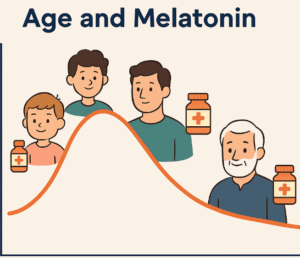Age and Melatonin: How Our Body’s Night Signal Changes Over Time
 Melatonin isn’t static across a lifetime. This “hormone of darkness” rises and falls not only across the day but also across the years. Understanding how age influences melatonin helps explain why children, adults, and older people often experience sleep so differently—and why supplements may (or may not) help.
Melatonin isn’t static across a lifetime. This “hormone of darkness” rises and falls not only across the day but also across the years. Understanding how age influences melatonin helps explain why children, adults, and older people often experience sleep so differently—and why supplements may (or may not) help.
Melatonin in Infancy and Childhood
-
Infants: Newborns produce very little melatonin in the first weeks. Sleep is irregular, driven more by feeding cycles than circadian rhythm. By 3–6 months, melatonin secretion matures, aligning with night–day patterns.
-
Children: Melatonin levels are strong in childhood, supporting deep, consolidated sleep.
-
Supplements: Generally not needed. In specific cases—such as children with autism, ADHD, or developmental disorders—low-dose melatonin, under medical supervision, can help regulate bedtime.
Melatonin in Adolescence
-
Melatonin release naturally shifts later in teenagers, creating a tendency to stay up late and sleep in.
-
This is biological, not “laziness.” But when paired with early school schedules, it often causes chronic sleep loss.
-
Supplements: Small doses in the early evening can sometimes help shift the body clock earlier, but strategies like morning sunlight exposure and reducing screens at night are first-line measures.
Melatonin in Adulthood
-
In healthy adults, melatonin secretion remains stable. Sleep issues at this age are often linked to lifestyle factors—stress, screen exposure, caffeine, or irregular schedules.
-
Supplements: Usually helpful for jet lag, shift work, or occasional insomnia. Timing is critical: 30–90 minutes before desired bedtime works best.
Melatonin in Older Adults
-
With age, overall melatonin output declines, and the nightly peak shifts earlier. Many older adults feel sleepy early in the evening and wake in the early morning. Sleep also becomes lighter and more fragmented.
-
Supplements: Low-dose melatonin (0.3–2 mg), taken in the early evening, can restore some of the natural rhythm. It works best when combined with good light hygiene—dim evenings, bright mornings.
Practical Guide Across Ages
-
Children: Rarely needed except in neurodevelopmental disorders.
-
Adolescents: Best used short-term to reset sleep timing, alongside light and behavioral strategies.
-
Adults: Helpful for travel, shift work, or mild insomnia.
-
Older Adults: Low-dose, early-evening melatonin may improve rhythm and sleep quality.
Bottom Line
Melatonin changes with age, shaping how we sleep at different life stages. Supplements can help—but only when matched carefully to age, timing, and purpose. They are not a universal fix, but when used wisely, they can support the body’s natural night signal.
About the Author
I’m Dr. Srinivas Rajkumar T, MD (AIIMS, New Delhi), Consultant Psychiatrist based in Chennai. Through my clinical practice and writing, I aim to make psychiatry more understandable and less intimidating.
📍 Mind and Memory Clinic, Apollo Clinic, Velachery, Chennai (Opp. Phoenix Mall)
📞 +91 85951 55808
🌐 srinivasaiims.com